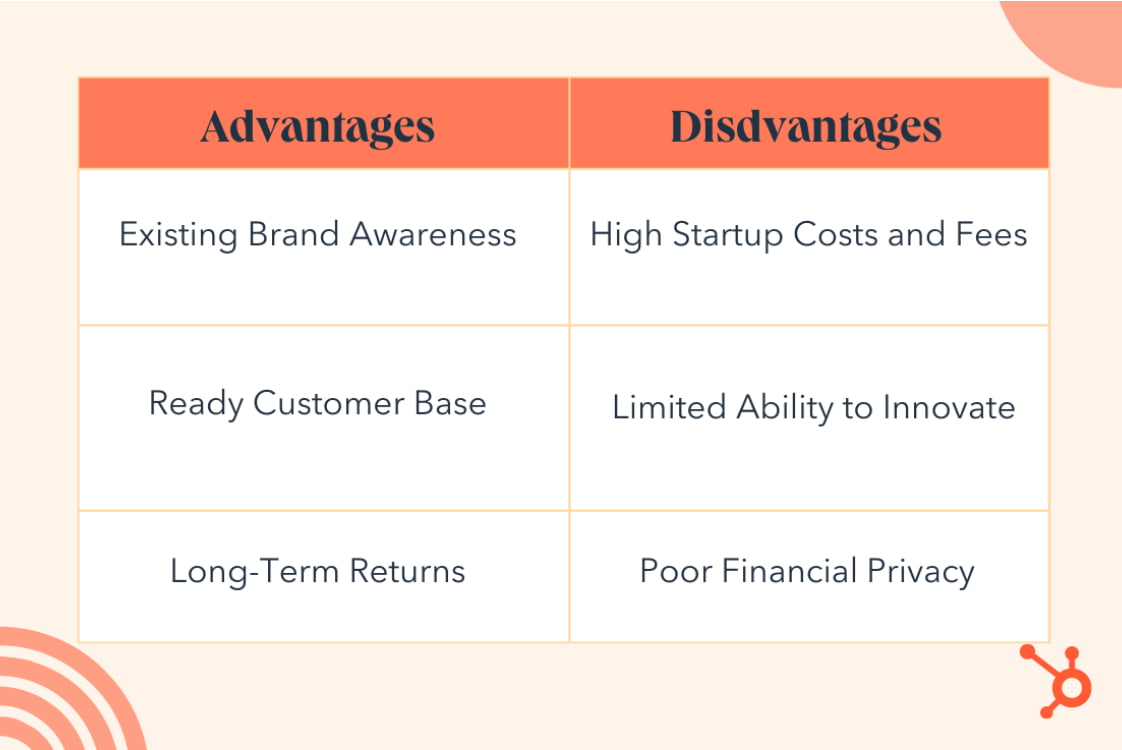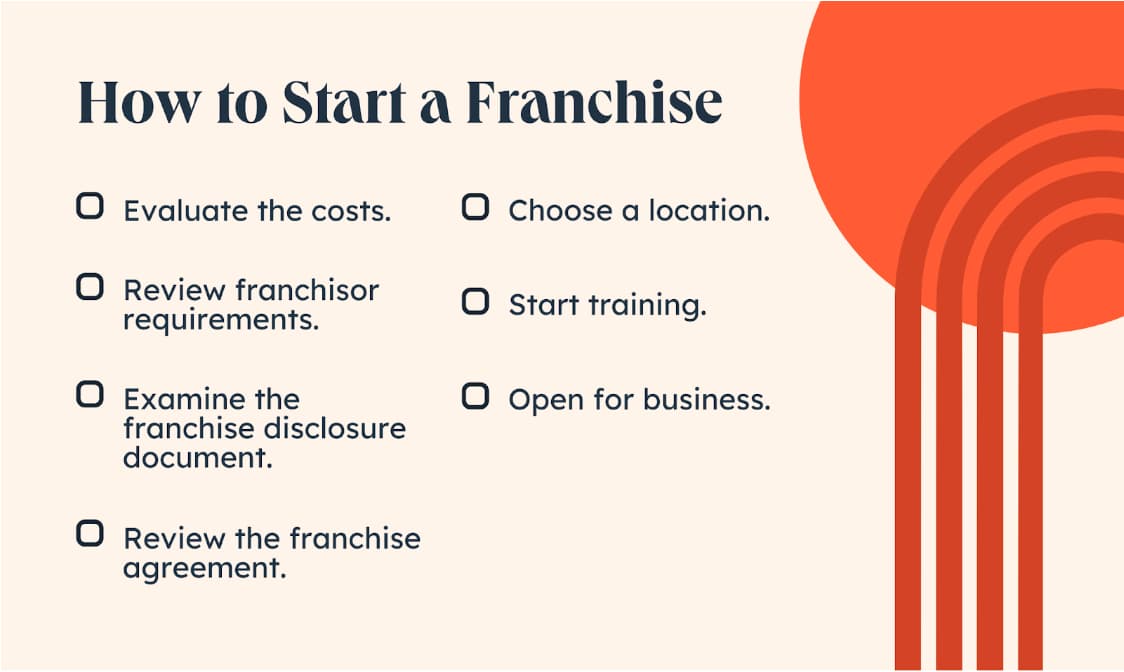Franchises are entrepreneurial opportunities that let you use the established brand and model of another company to start your business — think restaurants, gyms, and more. While operating a franchise takes hard work, many success stories show that you can succeed.
For instance, in 2009, Algy and Kermie Irvin opened a popular franchise location, Painting with a Twist. Not only did they provide their community with a creative event option, but they also saw an excellent return on investment, with projected annual growth of 19%.
Feeling inspired to own a franchise business? Keep reading to learn about different types of franchises, the pros and cons of this model, and how to start your first franchise.
Table of Contents
- What is a franchise?
- Advantages and Disadvantages of Starting a Franchise
- Types of Franchises
- What to Know Before Opting for Franchise Opportunities
- 7 Tips for Starting a Franchise
What is a franchise?
When you think of the word “franchise,” McDonald’s and Dunkin’ Donuts might come to mind. A franchise is a contractual relationship between an individual (franchisee) and a business (franchisor). The contract allows the franchisee to distribute the franchisor’s products and use its name and brand.
In 2022, about 792,000 franchises with an economic output of roughly 827 billion dollars were operating in the U.S. But which franchise should you open? And what’s necessary to get started? We’d dive into these, but first, let’s explore the pros and cons of starting a franchise.
Advantages and Disadvantages of Starting a Franchise

Advantages of Starting a Franchise
1. Existing Brand Awareness
Creating awareness for a new business is challenging. You need funds, tools, and a team. Starting a franchise curbs these limitations. Working with franchisors lets you leverage the enormous brand recognition they’ve built over the years with their funds, tools, and team.
2. Ready Customer Base
Franchisors are immensely popular. Using their name and branding makes your business the go-to location for customers who have loved the franchisor for years. That means you won’t struggle to find, acquire, and convince customers to trust your business.
3. Long-Term Returns
Franchisors usually have proven products and services. Their ability to stay long in the market suggests customers love what they offer. That means partnering with them gives you an excellent chance of generating long-term returns.
Disadvantages of Starting a Franchise
1. High Startup Costs and Fees
The cost of starting a franchise is prohibitive. Depending on your preferred franchise, you may need $20,000 to $100,000 or more to get started. You also have to pay royalties to the franchisor consistently. Typically, this ranges from 4% to 12% of your revenue. Some companies also charge a flat monthly fee.
2. Limited Ability to Innovate
Franchisors limit your ability to have creative control of your business. You can’t dictate your pricing, create new products or services, and decide on the product to sell. Some franchisors can even move your business to a new location to fulfill a business need.
3. Poor Financial Privacy
Most franchise agreements have a clause that lets the franchisor oversee the entire finances of the franchise. That means franchising might not be a great business idea if you detest people sticking their noses in your finances.
Types of Franchises
1. Restaurant
Over 32,000 businesses operate as full-service restaurant franchises. There’s an excellent chance you’ve gotten your favorite fast food or snacks from one of them. Some franchises operating in this space include:
- KFC.
- McDonald’s.
- Jersey Mike’s.
- Dunkin’ Donuts.
- Hardee’s Restaurants LLC.
- Sonic Drive-In Restaurants.
2. Retail
According to a report by FRANdata, an independent organization focusing on the franchise ecosystem, about 165,000 franchises exist in the retail food, products, and services industry. Popular examples include:
- 7-Eleven Inc.
- The UPS Store
- Miracle-Ear Inc.
3. Business Services
Based on the previously quoted report by FRANdata, business services franchises totaled 99,296 in 2021 and were projected to reach 100,727 in 2022. Some business services franchises are:
- Great Clips.
- Sports Clips.
- Our Town.
- Pay2Day.
4. Health and Fitness
If you want to evade the need to do lots of branding, create a sense of community, and build a loyal customer base, starting a health and fitness franchise business is a great idea. Examples of businesses in this category are:
- The Joint Chiropractic.
- Medi-Weightloss.
- Massage Envy.
- Planet Fitness.
5. Real Estate
There are about 70,000 operational real estate franchises, according to FRANdata. Some are:
- NextHome.
- RE/MAX LLC.
- Keller Williams.
- Realty One Group.
What to Know Before Opting for Franchise Opportunities
Doing research is an important step for starting your franchise business. You need to analyze your preferred industry to the letter. Are you passionate about food? Look into restaurant franchises. Are you a fitness buff? Check out gym and workout studio options.
Is there a need in your city or town? Can you fulfill this need with your franchise idea? For example, let’s say your community needs after-school programming or tutoring. Consider opening a franchise like Mathnasium, which offers tutoring for students.
It’s also a good idea to visit local franchises near you. Ask the owners to share what they love and dislike about their franchise. They’ll be able to speak to their experience with the franchise, and you’ll be well informed to make your final decision.
7 Tips for Starting a Franchise
Now that you’ve explored a few franchise opportunities, it’s time to get down to the nitty-gritty. Starting a franchise is an enormous commitment, and there are a few things to consider.
1. Evaluate the costs.
Like any other small business, there are initial costs to getting your franchise off the ground. Here are some common start-up investments:
- Franchise fee. The franchise fee is the flat cost a potential franchisee pays upfront to operate the franchise. Before you pursue a franchise opportunity, make sure you can cover the initial costs, which typically range between $20,000 and $50,000 and can be as much as $100,000, depending on the size of the franchise. Luckily, there are options for financial assistance, like an SBA loan or bank loan. These can bolster your initial cash investment in the business.
- Equipment and supplies. Franchisors will provide you with an idea of what equipment will be necessary and how to get it. Some even offer financing options for these initial costs.
- Real estate. The franchisor often recommends location types and can advise you on what will work best for your business. For example, McDonald’s has specific requirements for their locations (e.g., a building area of 4,500 square feet and on-site parking).
2. Review franchisor requirements.
A franchisor often has requirements that a franchisee must meet before offering a franchise agreement. For example, 7-Eleven requires new franchisees to have U.S. citizenship or permanent residency, an excellent credit score, pass a comprehensive background check, and have retail experience.
Other common details a franchisor might consider include:
- Net worth.
- Industry experience.
- Cash available.
- Other sources of income.
These may vary depending on the industry you are joining. And it’s best to contact the franchisor you’d like to work with to get more details.
3. Examine the franchise disclosure document.
A franchisor must provide you with a franchise disclosure document (FDD) before you both sign any contracts. It will include information regarding initial fees, estimated initial investment, and much more.
The franchise disclosure document provides potential franchisees with the information they need to decide on entering into a contract with a franchisor.
4. Review the franchise agreement.
Once the franchisor approves your application, they’d provide you with a franchise agreement. You’ll sign this contract to become a franchisee and own and operate a business under the franchisor.
It may be helpful to hire a lawyer with franchise experience to help you carefully review and understand the agreement. When you’re ready, sign to begin your journey as a franchisee.
5. Choose a location.
Next, you’ll need to find a place to set up shop. Buying property and leasing an existing space are both options depending on how much money you’re willing to pay upfront. Franchisors often provide recommendations for the type of space that will work best.
This is the time to work closely with your franchise to ensure your chosen site is the correct size for your needs. You want to be sure that the site’s traffic patterns and foot traffic align with the hours your franchise will operate.
Rent costs are another consideration, and it’s best to work with a legal advisor to ensure the lease is the best fit for you and your franchisor. You should also assess the competition in your area to ensure your profits are substantial.
6. Start training.
It’s time to learn the ins and outs of the business. Franchisors offer training sessions to teach you and your new hires all you need to know about the products or services you’ll sell, their guidelines and policies, and the systems you’ll use.
Your franchise will often provide training on marketing, management, and business basics you’ll need to operate the business.
7. Open for business.
Once your franchisor sends a representative to approve your location, it’s time to market your grand opening. Franchisors usually have pre-determined ads, signage, and promotion ideas for the opening.
They might even provide you with a corporate consultant to ensure the opening day runs smoothly.

Getting Started
Congratulations! You’re well-prepared and ready to open. Get set for your new life as a franchisee. If you’re inspired to start a franchise, use this blog as a toolkit to hit the ground running.

![]()



